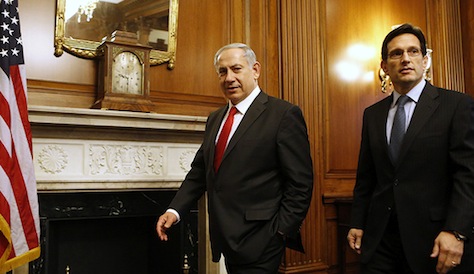The eyes of the entire political elite were on the 7th congressional district Thursday night, as the majority leader of the US House of Representatives, Eric Cantor, lost a primary election to challenger Dave Brat, an economics professor at Randolph-Macon College by margin of 55.5% to 45.5% among mostly Republican voters in a sprawling exurban district that includes Richmond’s northern hinterland and the faintest southwestern hinterland of the DC metro area.![]()
The most immediate response from pundits is that Cantor’s loss all but dooms the chances for immigration reform between now and 2016:
Coming off President Barack Obama’s re-election, immigration reform was seen as an issue both parties could deal with quickly. Democrats wanted to deliver on promises made to their Latino backers and Republicans wanted to get the issue off the table to avoid reliving the electoral demographic nightmare of 2012.
But House GOP leaders have long said they wouldn’t bring up the Gang of Eight bill the Senate passed last year, and Cantor’s embrace of even piecemeal proposals was derided by opponent Dave Brat and tea party activists as “amnesty” for undocumented immigrants.
That’s probably right.
While there were almost certainly several reasons for Cantor’s loss to Brat, a conservative insurgent supported by Tea Party enthusiasts and several top conservative radio talk show hosts, the perception that Cantor’s muddled position on supporting at least a tepid version of immigration reform will almost certainly scare House Republicans from supporting any version of reform between now and the 2016 election. Political writers were already calling Cantor’s shocking loss a harbinger of difficulty for the presidential hopes of former Florida governor Jeb Bush, who’s weighing a run, and who has called illegal immigration to the United States an ‘act of love.’
That, of course, has obvious implications for US foreign policy in Latin America, where immigration reform is one of the top regional issues, alongside enhancing trade, drug policy and promoting economic and political development.
It’s the first time since 1899 that a House majority leader, second in rank only to the speaker of the US House, currently John Boehner of Ohio, has lost an election, and it’s a political earthquake reminiscent of Democratic speaker Tom Foley’s 1994 loss in his own House district in Washington state or of the Democratic US Senate minority leader Tom Daschle’s loss in 2004.
But both of those upsets were not entirely unexpected, and they came at the hands of surging Republican candidates in November general elections, not to underfunded Tea Party renegades in a primary election.
There will, no doubt, be plenty of commentary on Cantor’s loss in the hours and days ahead. Most immediately, Cantor’s defeat creates a looming hole in the House Republican leadership — Cantor’s position as House majority leader was so secure that he was thought to be the favorite to succeed Boehner as House speaker.
But what, if anything, will Cantor’s loss mean for foreign affairs?
It’s worth noting that Cantor was not merely the only Jewish Republican in the House caucus (one among 233 lawmakers), he was the highest ranking Jewish member of the US Congress in American history. Though there’s no shortage of support on Capitol Hill for Israel, especially among Republicans, Cantor (pictured above with Israeli prime minister Benjamin Netanyahu) held a special role for Jewish conservatives in the United States. When Netanyahu visited the United States four years ago, he met privately with Cantor before an official visit with Hillary Clinton, then the US secretary of state at the time, and he told Netanyahu that House Republicans would act as a ‘check’ on the administration of US president Barack Obama.
Although there’s no love lost for Cantor among Jewish Democrats, who largely noted they wouldn’t be sorry to see his exit from Congress and from the House leadership, his loss is a blow to big-tent Republicans who desire as broad and diverse a leadership as possible.
Nonetheless, Cantor was a top Netanyahu ally among the House Republican leadership ranks. Just earlier this week, as US diplomats softened their opposition to the new unity Palestinian government between the competing Fatah and Hamas factions, Cantor reiterated his call to suspend US aid to the Palestinian Authority.
But Cantor’s loss isn’t just a defeat for Netanyahu.
As Timothy B. Lee at Vox also notes, Cantor’s loss is also bad news for the National Security Agency: Continue reading What Eric Cantor’s stunning primary defeat means for world politics
